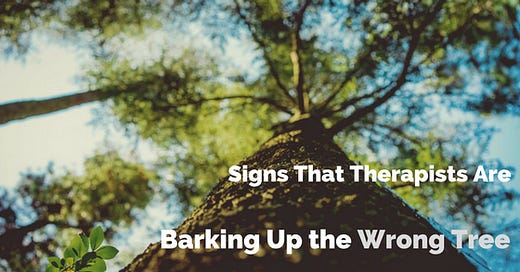Signs That Therapists are Barking Up the Wrong Tree in Our Professional Development
Updates from
Frontiers of Psychotherapist Development
At the Bleeding Edge of Development, Reaping Benefit for Our Clients.
In the 03/06/2017 edition:
*|MC:TOC|*
Signs That Therapists are Barking Up the Wrong Tree in Our Professional Development
By darylchow on Mar 06, 2017 08:10 am
Sometimes you climb the ladder to the top,
only to discover that you’ve placed it against the wrong wall. ~ Joseph Campbell
I’m going to re-look at some deeply held truths we were taught to believe about professional development in the field of psychotherapy.
Actually, if these truths are closely examined, they are perpetuated lies.
What’s worse than falsehood is a distorted truth.
This is not an attempt to put up a straw man about our field. Rather, I hope we can
a) Stop digging ourselves into a deeper hole, and
b) Get ourselves out of the entrenchment.
Before you read on, answer the following question:
Do you consider yourself a person who is open to challenging your own assumptions?
If you are, read on. If not, the following list is going to cause you some discomfort.
Here it goes:
In no particular order, here are signs that we are barking up the wrong tree in our professional development:
On Learning:
1. We think that being in a state of flow means you are experiencing deep learning.
2. We equate feeling benefit from clinical supervision as actual learning.
3. We think that we can get better by engaging in deliberate practice within particular schools of psychotherapy.
4. We think PD/CEU activities (trainings, workshops, seminars) are going to get you better as a therapist.
5. We conflate learning and performing.
6. We amass content knowledge in specific areas and fail to deepen our interpersonal skills.
7. We watch master therapists in action and try to emulate them.
8. We pursue what’s new.
On Experience:
9. We fail to distinguish between clinical experience and skills acquisition and maintenance.
10. We think client feedback is going to help us better as a therapist.
11. We say that clients are our best teachers.
12. We think that once we amassed enough confidence in our practice, we get into flow states easily, and start to believe that we have arrived.
On Beliefs in Therapy:
13. We think there is a right way to do therapy.
14. We think therapy models hold some truths instead of seeing them as metaphors to guide.
15. We overvalue the idea that adhering to a model of therapy will get you better.
16. We conflate our feeling of benefit with actual client benefit.
17. We think fitting the right clinical diagnosis/ clinical formulation / treatment plan for your client matters towards the outcome.
My hopes for putting this forth is so that we can instead begin to plant seeds of transformation on fertile ground for us to grow our craft.
Over the course of the next several weeks, I will be expanding on each of these points, and why we are wasting our efforts in these.
Love to hear your initial thoughts about this.
Stay tuned by subscribing to this list (see below).
Best Wishes,
Daryl Chow, Ph.D.
Recent Articles:
Mastery Learning for Therapists: Figure Out the “What” Before the “How”
What Have You Changed Your Mind About?
How Do You Get Better At Eliciting Feedback?
How Do You Get Better at Receiving Feedback?
Scenius vs. Genius






